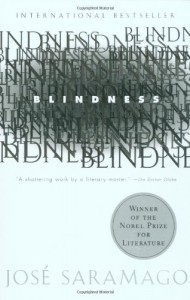
When you sit in a coffee shop at the corner of two busy streets and read a book about blindness, you find yourself thinking unfamiliar thoughts, and you believe, when you raise your head to watch the people passing, that you see things differently. You notice the soft yellow light of the shop reflecting off the bronze of the hardwood floors. You notice among the people coming from the train two girls who intersect that line, spilt, call back, and go their ways, dividing into the two directions of larger traffic. When the girl working the shop goes out and leans against the brick entrance – to clear her head of coffee smells or just to see more of the sky – you feel the breeze blow in, and you smell it, and you feel that all these things – the sights and smells of a place you already know – are now something different. The place you know, you don’t know. It becomes mysterious, romantic: a newness you don’t have to search for, or travel toward, because you are already among it. You only want to feel more of it sweep over you, and as a result feel new yourself. If only for a few minutes longer.You walk home and notice a discarded knit hat at the foot of a tree; you see the street cleaners’ orange signs tied to tree trunks, lampposts, telephone poles. You see a train run alongside you the color of the silver clouds, of the reflected golden light. You see people, in all their shapes, walk past you, each individual and anonymous. You feel anonymous yourself, and therefore more forgiving, more patient. You think everything is possible. You think everything possible must already exist. You think again of something you already believe: that people read the books that find them. That stories arrive to tell themselves, as relevant as news.A little King, a little Camus, a little Gabriel Garcia: which is to say Blindness is a lot of everything.
 When you sit in a coffee shop at the corner of two busy streets and read a book about blindness, you find yourself thinking unfamiliar thoughts, and you believe, when you raise your head to watch the people passing, that you see things differently. You notice the soft yellow light of the shop reflecting off the bronze of the hardwood floors. You notice among the people coming from the train two girls who intersect that line, spilt, call back, and go their ways, dividing into the two directions of larger traffic. When the girl working the shop goes out and leans against the brick entrance – to clear her head of coffee smells or just to see more of the sky – you feel the breeze blow in, and you smell it, and you feel that all these things – the sights and smells of a place you already know – are now something different. The place you know, you don’t know. It becomes mysterious, romantic: a newness you don’t have to search for, or travel toward, because you are already among it. You only want to feel more of it sweep over you, and as a result feel new yourself. If only for a few minutes longer.You walk home and notice a discarded knit hat at the foot of a tree; you see the street cleaners’ orange signs tied to tree trunks, lampposts, telephone poles. You see a train run alongside you the color of the silver clouds, of the reflected golden light. You see people, in all their shapes, walk past you, each individual and anonymous. You feel anonymous yourself, and therefore more forgiving, more patient. You think everything is possible. You think everything possible must already exist. You think again of something you already believe: that people read the books that find them. That stories arrive to tell themselves, as relevant as news.A little King, a little Camus, a little Gabriel Garcia: which is to say Blindness is a lot of everything.
When you sit in a coffee shop at the corner of two busy streets and read a book about blindness, you find yourself thinking unfamiliar thoughts, and you believe, when you raise your head to watch the people passing, that you see things differently. You notice the soft yellow light of the shop reflecting off the bronze of the hardwood floors. You notice among the people coming from the train two girls who intersect that line, spilt, call back, and go their ways, dividing into the two directions of larger traffic. When the girl working the shop goes out and leans against the brick entrance – to clear her head of coffee smells or just to see more of the sky – you feel the breeze blow in, and you smell it, and you feel that all these things – the sights and smells of a place you already know – are now something different. The place you know, you don’t know. It becomes mysterious, romantic: a newness you don’t have to search for, or travel toward, because you are already among it. You only want to feel more of it sweep over you, and as a result feel new yourself. If only for a few minutes longer.You walk home and notice a discarded knit hat at the foot of a tree; you see the street cleaners’ orange signs tied to tree trunks, lampposts, telephone poles. You see a train run alongside you the color of the silver clouds, of the reflected golden light. You see people, in all their shapes, walk past you, each individual and anonymous. You feel anonymous yourself, and therefore more forgiving, more patient. You think everything is possible. You think everything possible must already exist. You think again of something you already believe: that people read the books that find them. That stories arrive to tell themselves, as relevant as news.A little King, a little Camus, a little Gabriel Garcia: which is to say Blindness is a lot of everything.










